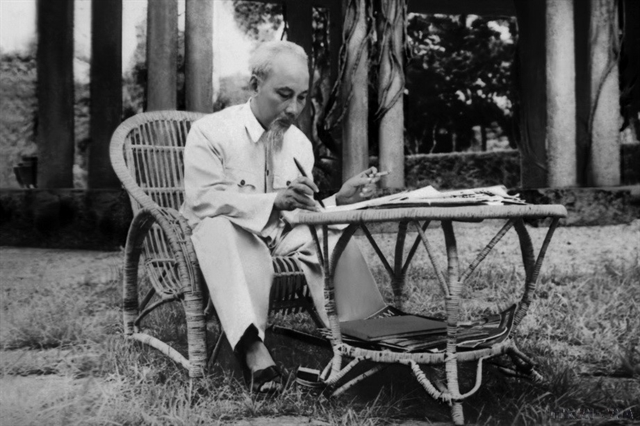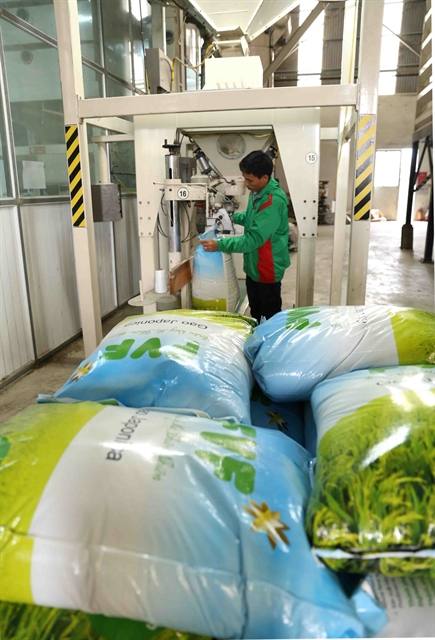 Economy
Economy

 |
| Bảo Minh Agricultural Products Processing and Trading Joint Stock Company in Hà Nội has established production and consumption links with cooperatives in rice cultivation and trade to ensure sufficient rice supply for both domestic consumption and export. — VNS Photo |
HÀ NỘI — The capital city of Hà Nội has recently taken proactive steps to restructure its rice cultivation sector, supporting farmers in shifting toward the production of high-quality commercial rice that meets export standards.
This effort is part of a broader strategy to expand the rice export market and improve the competitiveness of Vietnamese rice in international markets by 2030.
In addition, the city is working closely with cooperatives and enterprises to establish raw material zones, strengthen production–consumption links, and expand export channels for rice products.
Alongside efforts to increase the domestic and international market value of rice, Hà Nội’s agricultural sector is supporting localities in developing high-quality rice cultivation areas that meet export criteria.
These initiatives are attracting enterprise participation in value chains and helping secure product off-take agreements for farmers.
Designated as a high-quality commercial rice production area, Đồng Phú Commune in Chương Mỹ District currently cultivates 47ha of Japonica rice, a premium variety originating from Japan.
Director of Đồng Phú Organic Agricultural Cooperative Trịnh Thị Nguyệt said: “Our cooperative applies environmentally friendly cultivation methods. The rice is aromatic, tasty and certified by both US and Japanese standards. Thanks to this, the value of Đồng Phú organic rice is much higher than conventionally grown varieties.”
“Additionally, we have established a strong production–consumption chain. All of our organic rice is sold under stable off-take contracts, with prices 10–15 per cent higher than those of traditional rice. Đồng Phú organic rice is now exported to several international markets,” Nguyệt added.
Bùi Thị Hạnh Hiếu, general director of Bảo Minh Agricultural Products Processing and Trading JSC, said that her company has built comprehensive value chains with cooperatives nationwide to ensure consistent supply for both domestic consumption and exports.
These links have enabled the development of organic rice material zones for deep processing and commercial distribution, she said.
Bảo Minh currently collaborates with farmers across approximately 20,000ha nationwide.
In Hà Nội alone, the company partners with farmers in Đồng Phú Commune of Chương Mỹ District, Tam Hưng Commune of Thanh Oai District and Phù Lưu Tế and Tuy Lai communes of Mỹ Đức District, with each locality cultivating 50–100ha.
Deputy Director of the Hà Nội Department of Agriculture and Environment Nguyễn Mạnh Phương said that the city possesses a large rice cultivation area of about 160,000ha with annual output of around 1.1 million tonnes. The rice varietal structure is increasingly shifting toward high-quality types.
Under Decision 5242/QĐ-UBND dated November 30, 2020, Hà Nội approved the Development Plan for Japonica and high-quality commercial rice production for export.
Thus far, over 200 large-scale rice production zones have been established, totaling about 40,000ha.
The city has also developed 16 rice zones across 16 communes that meet export standards. These zones have recorded efficiency gains of 10–15 per cent compared to traditionally cultivated varieties.
Ten businesses in the city are currently licensed by the Ministry of Industry and Trade to export rice. In 2024, Hà Nội’s rice export turnover reached US$645 million, accounting for 3.7 per cent of the city’s total exports.
Key markets include Indonesia, Cuba, Côte d’Ivoire, South Korea and Turkey.
To further expand rice material zones for export, Nguyễn Văn Bùng, director of Liên Mạc Agricultural Cooperative in Mê Linh District, emphasised the need for targeted support.
He proposed providing low-interest credit packages to cooperatives to invest in preliminary processing facilities and product showrooms.
He also called for stronger enterprise–cooperative partnerships to supply seeds and agricultural inputs, promote branding and stabilise prices.
Hà Nội is set to continue maintaining and expanding 200 zones for Japonica and high-quality rice production following safety, VietGAP and organic standards. The city also plans to develop 3–5 zones for medicinal rice production and to promote post-harvest technologies such as drying, processing and storage. Furthermore, 3–5 integrated value chains will be formed for both domestic consumption and export.
To optimise land use, the city is converting inefficient rice cultivation areas to other crops, while consolidating remaining fields into large-scale, mechanised production zones. Investment in infrastructure, irrigation and transportation for specialised rice areas is also enhanced.
Support is being extended to cooperatives and enterprises to adopt high-tech and Industry 4.0 applications in production, preliminary processing, packaging and marketing.
Efforts are also being made to develop and protect geographical indications and branding tied to digital traceability systems. Hà Nội is also strengthening the registration and management of planting area codes in accordance with export standards.
To expand market access, the city will step up trade promotion and product marketing to increase consumer awareness of high-quality agricultural products. It will study international markets, especially those with large consumption demands such as China, Japan and South Korea, while also increasing market research, trade fair participation and export-oriented production planning.
The development of high-quality rice raw material zones in Hà Nội is considered a strategic initiative with great potential. It not only contributes to national food security, but also plays a crucial role in building a clean and sustainable agricultural export value chain. The key lies in strong links between farmers, cooperatives, enterprises and local authorities.
With its central role, robust infrastructure and favourable international trade connections, Hà Nội is fully capable of completing a premium rice value chain – from the fields of the Red River Delta to dining tables around the world. — VNS




